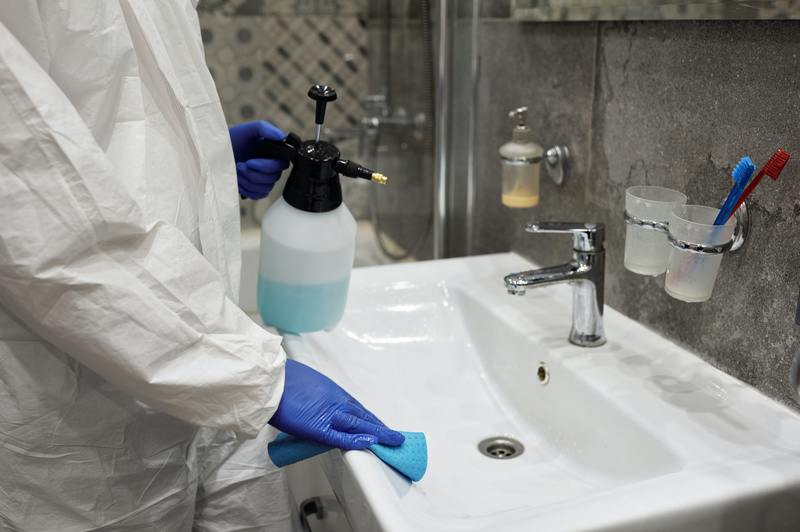The right knowledge and proper preparation on “what to do after pest control sprays” are what most homeowners need. These unwanted creepy visitors at home, such as cockroaches, termites, bed bugs, flies, rats, spiders, and other kinds of insects can be gone through the help of professionals.

The Importance Of Pest Control
It is necessary to do pest control sprays at home because pests like rodents are dirty, and some of them carry different kinds of diseases that can be harmful to your family’s health. Thus, keeping your family safe and healthy will also make you free from worry.
How to prepare before pest control sprays
Homeowners must make necessary preparations before starting the pest control service.
- Make sure that there is free access for the exterminators so that they can move easily
- Transfer your kids and pets to another safe place
- Put clothes, shoes, toys, kitchen utensils, and other important things into a box and seal it carefully
- Use the plastic wrapping to cover your sofa, tables, and chairs
- Make sure that dustbins are empty
- Remove all bed covers, pillows, mattresses (here’s a guide to know what lives in your mattress and how to prevent them), and other essential things and put them on a storage box
- Use plastic containers to store your foods. Do not leave them outside since the pest control solutions may contaminate them
- Unplug your home appliances and cover them with plastic wrapping
- Do a deep cleaning into your bathroom and kitchen to avoid mishaps
Steps To Do After Pest Control Sprays
We have here 6 easy steps on what to do after pest control treatment in your house.
Step #1. Safety precautions
To prevent the risk of contamination, you must follow the instructions and safety precautions from the pest control professionals. Since they know the types of chemicals and their toxicity, you must listen to their advice to avoid unsafe acts.
Step #2. Wait until the chemicals get dry
Most pesticides contain strong chemicals that can be harmful to your health. You must wait until the exterminators give you the signal or confirmation that the chemicals are already dry and it is safe to come into your house.
Step #3. Check cracks and leaks
Look for wall cracks, holes, and water leaks. Make sure that you get someone to fix them because they will become entry points for pests that may lead to the development of re-infestation.
Step #4. Discard left-over foods
If there are leftover foods in the house, you must throw them in the garbage outside your home. Be cautious not to eat those foods because even if the exterminator uses pesticides with organic chemicals, it is still not safe for you.
Step #5. Avoid cleaning the house immediately
Pest control experts know exactly what kind of pest control treatment your house needs, and the types of chemical sprays only take effect if you let it a little longer. Avoid deep cleaning of the house for at least a week.
Step #6. Check if there are remaining pests
Typically, after having a pest control treatment, you will find dead pests everywhere and you have to clean them because it will attract other pests. Also, you have to check for the remaining ones and kill them right away.
What to expect?
It is most likely to happen that there will be a pest break out in your home. Expect an increase in the presence of some bugs coming out of cracks and holes.
You have to kill them on the spot, clean them immediately, and if you want to know what scent keeps bed bugs away, click the link for a good tip.
Are pest control sprays harmful?
Since pesticides are developed to kill pests, indoor utilization of it can pose health risks to you and your family, especially to children. According to research, there is a high risk of children having leukemia or cancer if they are left unprotected during indoor pesticide activity or having professional pest control sprays at home.
How often should I do pest control?
Pests can be so irritating that you would want to get rid of them all in just a snap, but when it comes to pest control, regular treatment is essential. The ideal frequency of indoor pest control activity you can do is at least twice a month.
What are the side effects of pest sprays?
Either organic or chemical, pest sprays have their side effects. Exposure to pest control sprays can lead to:
- Throat irritation
- Trouble in breathing
- Nausea
- Eyes becomes watery or dry
- Dizziness
- Skin rashes and itchiness
- Vomiting
- It can also trigger asthma
Conclusion
Now that you are aware of the necessary steps, side effects, and how pest control sprays can affect you, your main goal now is to make it true to your life. Being knowledgeable on what to do after pest control sprays will surely keep you free from inconvenience.
